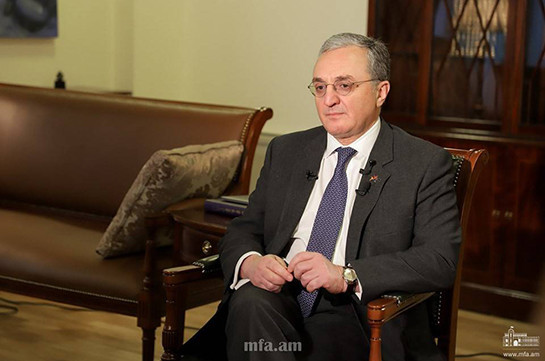
31/07/2019 16:44
We are strictly pro-Armenia and our foreign policy is strictly Armenia-centered: Armenia’s FM
Armenia’s Foreign Minister Zohrab Mnatsakanyan gave interview to Jonathan Katz, German Marshall Fund Senior Fellow.
Question. What was the impact of the Velvet Revolution of 2018 on Armenia’s foreign policy agenda, particularly toward some of your bigger partners: Russia, the United States, and the European Union?
Answer. I think the most important challenge before us, the most important priority, was to make it very clear that Armenia’s Velvet Revolution was strictly about Armenia and it was a strictly a domestic affair; that this was a very important development in Armenia for Armenians; for consolidating public institutions, democratic institutions to serve the nation and economy better, to serve our national security agenda better, to serve the purposes of stability through democratic institutions.
Strengthening our democracy was a matter of our evolution as a society, as is the strengthening of our state, and strengthening our national security agenda. Armenia’s foreign policy has been built in a very careful way to consolidate the national security architecture through engagements with our major partners Russia, the European Union, and the United States. So, we were not adventurous to risk rocking the boat to an extent that we could undermine the purposes of the Velvet Revolution and undermine the security of the nation.
We are not pro one direction or another. We are strictly pro-Armenia and our foreign policy is strictly Armenia-centered. And within this, through a strategic approach, we have carefully built a national security architecture, of which foreign policy is an important part, and within which strong relations with each our partners have an important part to contribute to our national security, in their own way.
Question. Are there examples of how the United States and Russia can address their differences, reduce tensions, and move their relationship forward in the right direction, and what role can Armenia play to help this?
Answer. There is a very good example of cooperation of Russia, the United States, and a European country, France, working together as co-chairs of the OSCE Minsk Group. Countries that may not necessarily agree on many issues on the international agenda, but in this particular case it’s a very well-coordinated, very strongly consolidated form of co-operation that works very well for the specific purpose they are set, which is the peaceful resolution of the Nagorno-Karabakh conflict.
If we elaborate further on the role of Armenia, we are interested in further stability and reducing tension. Armenia can contribute to stability in the region. When you have an island of stability, like Armenia, it works well for everyone. We’re willing to be contributors to stability. We can be contributors by way of denying confrontation, by way of absorbing the areas in which the interests can be combined for the sake of stability. We can be contributors to that.
Armenia has been genuine in demonstrating a capacity to address difficult challenges. That it is possible to build relations with your major partners—Russia, the EU and the United States —while also having in mind, especially now, the turbulent time and the challenges that have obviously arisen, and still insisting on the capacity to build relations with one partner never at the expense of another.
Question. Relations are strengthening between Armenia and the EU. How can Armenia take full advantage of its Comprehensive and Enhanced Partnership Agreement (CEPA) with the EU and what is the timeline for it to enter into force?
Answer. This important agreement enhances a growing political and economic dialogue and partnership with the EU. The question of the CEPA fully entering into force is rather more a technical one because it is practically in force. Why? Because we already have a mechanism, a provisional application. Armenia ratified it; the European Parliament ratified it; now it takes 28 EU countries to ratify it and each of them has their own method. Eighteen EU members have already ratified it. So, currently there are still 10 to do so and they’re going to, there is no political impediment to that. It’s just a domestic procedure. In fact, we already have 80 percent of all the provisions in the implementation phase. We have coordinated and agreed to the roadmap for implementation and the implementation is underway.
Europe has been a consistent, continuous participant in Armenia’s development agenda—in the development of its institutions, in the development of the state, and in the development of its economy. Since the Velvet Revolution in 2018, we have been in very intensive and extensive political and economic engagement with the EU. As part of this process, we would like to see a visa liberalization dialogue with the EU that will lead to an agreement.
Today, we have the CEPA as the new legal foundation on which we continue doing what we do, and we take further steps in that direction to benefit Armenians. The CEPA is a document that contains a political part, a justice and freedoms part, and a broad sectoral part. It is a comprehensive agreement that includes transport, energy, environment, trade and economy, culture, education, etc. It provides for regulatory approximation between Armenia and the EU and enhanced trade and investment. Therefore, the CEPA is an instrument for us to further upgrade our regulations on norms or standards, which can contribute to an essential framework for the development of our nation.








